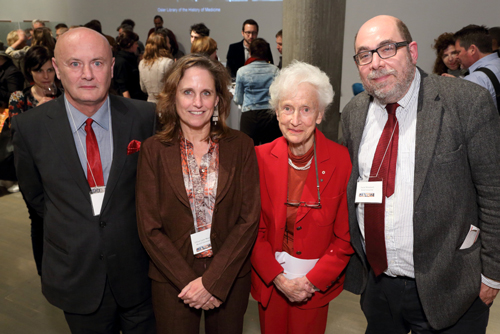
By Victoria Leenders-Cheng
Fifty years ago, the French Canadian Studies Center, the first of its kind in Quebec, launched at McGill. The Center became the Quebec Studies Program in 1993 and, this year, to celebrate the Center’s 50th anniversary, a group of 21 McGill researchers has founded the Centre for Interdisciplinary Research on Montreal (CIRM).
CIRM held its inaugural public event on October 18, 19 and 21, with three days of talks to address Montreal as a multicultural city, issues of governance, democracy, citizenship, architecture, design, language and creativity. Entitled “Questioning Urban Creativity: Montreal, a Case Study,” the conference concluded with a lecture by distinguished scholar and architect Witold Rybcynski.
“Considering the importance given to the concept of creative cities, the colloquium was an unique occasion to gather multidisciplinary expertise to help us better understand and critique the case of Montreal as a ‘creative city,’” said Quebec Studies Coordinator and CIRM steering committee member Stephan Gervais.
McGill Law professor Shauna Van Praagh spoke about finding inspiration for thinking about laws, and customs by taking a walk through the mixed neighbourhoods of Montreal, such as Mile End and Outremont, where a Japanese paper store can sit next to a potters’ cooperative and a Jewish Hassidic pastry shop. “This is social diversity in action,” Van Praagh explained, adding that within this diversity are possibilities for creative variation, space for unexpected interaction and dynamic landmarks or points of reference.”
University of Western Ontario political scientist Andrew Sancton suggested that Montreal’s struggles with municipal amalgamation might find quick resolution in or inspiration from the borough system of Greater London, which has no dominant central city but comprises 32 boroughs and a Greater London Mayor and Assembly. Montreal’s municipal structure, Sancton pointed out, already resembles this model, even if not by design, and such a structural change would involve very little institutional re-organization, avoid changes to borough boundaries and would create no new political offices.
Doctoral student Sunita Nigam discussed the role that well-known comedian Sugar Sammy, with his familiarity and ease in discussing the French, English and multicultural facets of Quebec identity, plays in articulating what Montrealers want from their city.
Nigam’s talk finished with an unexpected twist as Martin Langlois, Sugar Sammy’s manager, stood up in the audience and introduced himself. He explained that Sugar Sammy himself had asked him to attend on his behalf, then proceeded to offer insights into the comedian’s show and into the unexpected success Sugar Sammy has found in Quebec – including becoming the first non-francophone to win big at the Oliviers, Quebec’s comedy awards – after having first become better known outside of the province.
And McGill Architecture professor David Theodore presented a scathing look at architectural decisions made in Montreal that failed to consider how the public already used a space that was then re-developed – such as the plaza in Place des Arts and the square outside St. James United Church on St Catherine Street.
The event also featured two round tables, one, moderated by Daniel Weinstock (Law) on research in the city and the second, moderated by Will Straw (Art History and Communications Studies) on Montreal’s role in fostering artistic creativity, both of which showcased the lively conversations that arise when community organizations and academic institutions meet.
“Montreal, as a Quebec, Canadian and North American city needs to have a multidisciplinary research hub devoted to its study,” noted Gervais. “The CIRM aims to contribute to innovative research for the benefit of both the academic and non-academic communities.”
With over 160 registered participants, he added, the colloquium was a strong demonstration of “how the combined analyses and voices of disciplines from the arts, humanities, social science and science could be a wonderful research asset for our understanding of Montreal.”
Explorations of creativity and innovation continue throughout the month of November at McGill with Innovation Week, which offers a series of events to celebrate McGill’s inquisitive spirit and to showcase the Quartier de l’innovation, a new hub of urban innovation led by McGill and the École de technologie supérieure.
